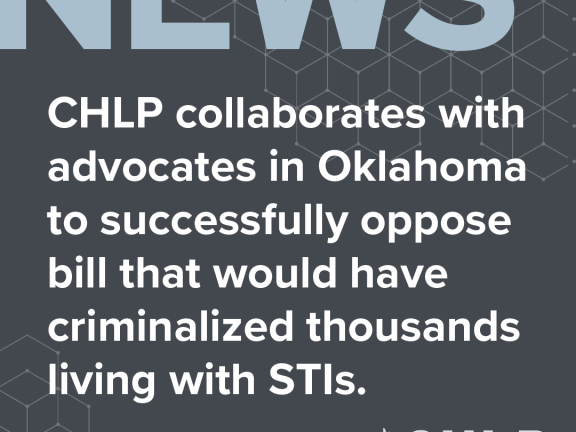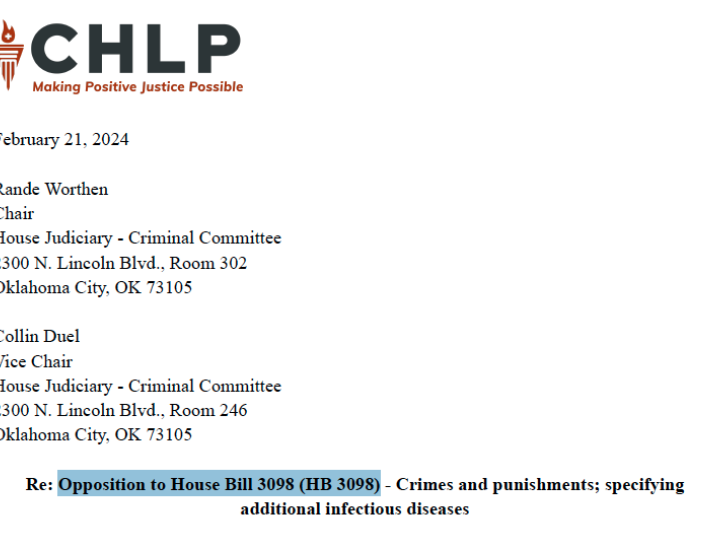STI Criminalization Bill Stopped in Oklahoma

CHLP collaborates with advocates in Oklahoma to oppose a bill that would have criminalized thousands of Oklahomans living with sexually transmitted infections.
The recent adjournment of the legislative session for the 59th Oklahoma Legislature marked the end of House Bill 3098 (HB 3098), which would have dramatically increased the number of health conditions criminalized under Oklahoma law.
The existing statute, Oklahoma Statutes Title 21 Section 1192 (Section 1192), imposes felony punishment, including a two-to-five-year prison sentence, on people living with smallpox, syphilis, or gonorrhea who intentionally or recklessly “spread or cause to be spread to any other persons . . . such infectious disease.” HB3098 would have added Hepatitis B virus, genital herpes, Human Papillomavirus (HPV), and Trichomoniasis to the list of criminalized conditions, potentially opening up more than 85% of the population to criminalization.
CHLP’s Positive Justice Project, including Staff Attorneys Jada Hicks and Sean McCormick and National Community Outreach Coordinator Kytara Epps, worked collaboratively with local and national advocates to oppose the legislation. Local efforts were led by Nicole McAfee, Executive Director of Freedom Oklahoma.
In testimony with the House Judiciary - Criminal Committee, CHLP emphasized that the bill would criminalize nearly all Oklahomans and worsen criminal legal system disparities for Black, Latine, Indigenous, and 2SLGBTQ+ Oklahomans.
CHLP also met with the National Coalition of STD Directors (NCSD) to broaden national awareness of the issue. In a state policy notice, NCSD noted the bill would potentially worsen barriers to STI testing and treatment and undermine efforts to expand expedited partner therapy. Oklahoma already has some of the highest diagnosis rates for sexually transmitted infections, including the fourth-highest rate of primary and secondary syphilis and the fifth-highest rate of congenital syphilis.
Hicks and McCormick also provided a virtual briefing to the members of the Oklahoma Senate Minority Caucus, offering talking points and countering the argument made by the bill’s sponsor Rep. Toni Hasenbeck that the legislation would reduce intimate partner violence.
“Laws that criminalize people living with STIs likely worsen the threat of intimate partner violence by providing another tool for abusers to force people to stay in abusive relationships,” observed McCormick. “We continue to hear stories from people living with STIs whose partners threaten to file a police report alleging a violation of an STI criminalization statute. The possibility of criminal prosecution and public disclosure of their status causes many survivors to stay in abusive relationships.”
Hicks addressed misinformation about the statute criminalizing only intentional transmission. “Under Section 1192 people who ‘recklessly [are] responsible’ for transmitting these conditions could face prosecution, but the term 'recklessness' is not defined in the statute, which poses significant risks of broad and subjective interpretations,” she explained. “Rather than promoting public health, it instills fear and discourages people from getting tested or disclosing their health status. We believe in education and support, not punishment, as the path to managing communicable diseases effectively.”
In addition to opposing HB 3098, the Oklahoma coalition worked with Rep. Mauree Turner to introduce House Bill 4139, which would have repealed four statutes that criminalize people living with certain medical conditions, including Section 1192. The bill would have also allowed individuals convicted of these offenses to apply for resentencing and records expungement.
“While the repeal legislation was unsuccessful, the defeat of HB 3098 prevented a more hostile environment for people living with or affected by stigmatized conditions,” said Epps. “The collaborative HB 3098 efforts are also a shining example of how local and national advocates come together to disrupt criminalization. We look forward to continuing to work with Oklahoma advocates and fighting against the ongoing criminalization of people living with stigmatized conditions.”
